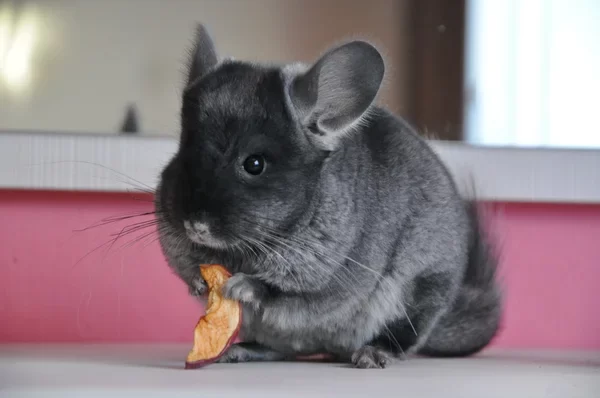How to Make a Pet Chinchilla Happy: Tips for a Joyful and Healthy Life
- Understanding Your Chinchilla's Needs
- Creating an Enriching Environment
- Diet and Nutrition for a Happy Chinchilla
- Exercise and Playtime for a Happy Chinchilla
- Health Care and Veterinary Visits
- Real-Life Stories of Happy Chinchillas
1. Understanding Your Chinchilla's Needs
To make your pet chinchilla happy, it’s essential to understand its natural behavior and needs. Chinchillas are active, social animals that thrive in an environment that mimics their natural habitat. They are nocturnal creatures, which means they’re most active at night, so it’s important to adjust their environment to their lifestyle.
Chinchillas are highly sensitive to temperature and humidity, so maintaining a cool, dry environment is critical for their well-being. Understanding these traits will help you create an environment that supports their happiness and health.
2. Creating an Enriching Environment
Chinchillas are curious creatures that require a stimulating environment to stay happy. Providing plenty of enrichment is key to their happiness. Here are some ways to enhance their living space:
- Climbing and Hiding Spaces: Chinchillas love to climb, jump, and hide. Set up shelves, ramps, and tunnels inside their cage to mimic their natural rocky habitat.
- Dust Baths: Chinchillas need dust baths to clean their fur, as water can damage it. Make sure to offer a dust bath several times a week in a safe, accessible space.
- Toys and Chews: Chinchillas love to chew, so providing wooden toys, untreated branches, and hay cubes will help keep their teeth healthy and provide entertainment.
Creating a space where your chinchilla can explore, jump, and interact with objects will significantly enhance its happiness and mental stimulation.
3. Diet and Nutrition for a Happy Chinchilla
A well-balanced diet is essential for your chinchilla’s health and happiness. The right food ensures that they get the nutrients needed to thrive, supporting both physical and mental well-being. Here's how to keep your chinchilla's diet healthy:
- High-Quality Hay: Hay should be the main staple of your chinchilla’s diet. It helps with digestion, provides fiber, and keeps their teeth from growing too long.
- Fresh Water: Always provide fresh water in a sipper bottle to keep your chinchilla hydrated. Dehydration can lead to health issues, so it’s vital to ensure they have access to clean water at all times.
- Pellets and Treats: High-quality chinchilla pellets are a great way to provide balanced nutrition. Limit treats to small amounts, as chinchillas can easily become overweight.
Feeding your chinchilla a proper diet will help keep them healthy and content, making it easier for them to live an active, happy life.
4. Exercise and Playtime for a Happy Chinchilla
Chinchillas are energetic animals, and regular exercise is essential for their physical and emotional well-being. They need plenty of space to run, jump, and explore. Here are some tips for ensuring your chinchilla gets enough exercise:
- Provide a Spacious Cage: Chinchillas need a large cage with plenty of room to move around. The larger the cage, the better, with multiple levels for climbing.
- Playtime Outside the Cage: Allow your chinchilla to explore a safe, chinchilla-proofed area outside of its cage. Make sure the area is free from hazards like electrical cords or sharp objects.
- Interactive Toys: Provide toys that encourage movement, such as exercise wheels or tunnels, to keep them active and engaged.
By providing ample opportunities for exercise, you’ll ensure that your chinchilla remains happy, healthy, and full of energy.
5. Health Care and Veterinary Visits
Regular health care is essential for keeping your chinchilla happy and healthy. Although chinchillas are generally hardy animals, they can develop health issues if not properly cared for. Here’s what you can do:
- Regular Check-ups: Take your chinchilla to the vet for regular check-ups to ensure it’s in good health and to catch any potential issues early.
- Proper Hygiene: Ensure your chinchilla's cage is kept clean, and keep an eye on its fur, teeth, and nails. Grooming is essential for maintaining their health.
- Monitor Their Behavior: Pay attention to your chinchilla’s behavior. Sudden changes, like lack of appetite or unusual lethargy, can be signs of health problems that need professional attention.
By providing proper care and regular veterinary visits, you’ll help ensure that your chinchilla stays happy and healthy for years to come.
6. Real-Life Stories of Happy Chinchillas
Many chinchilla owners have shared their experiences of creating happy, thriving pets. For example, Jessica, a chinchilla owner from California, shares her story:
"I’ve always wanted a happy chinchilla, and once I added more climbing spaces and interactive toys to his cage, he became much more active and playful. I also make sure to provide him with daily dust baths and plenty of time outside his cage. He’s a much happier chinchilla now!"
Jessica’s experience shows how small adjustments to your chinchilla’s environment and routine can significantly improve its happiness.
By following these tips for care and enrichment, you can make your chinchilla a happy and healthy companion. Learn more about caring for your chinchilla and find recommended products at Hidden Brook Veterinary.










